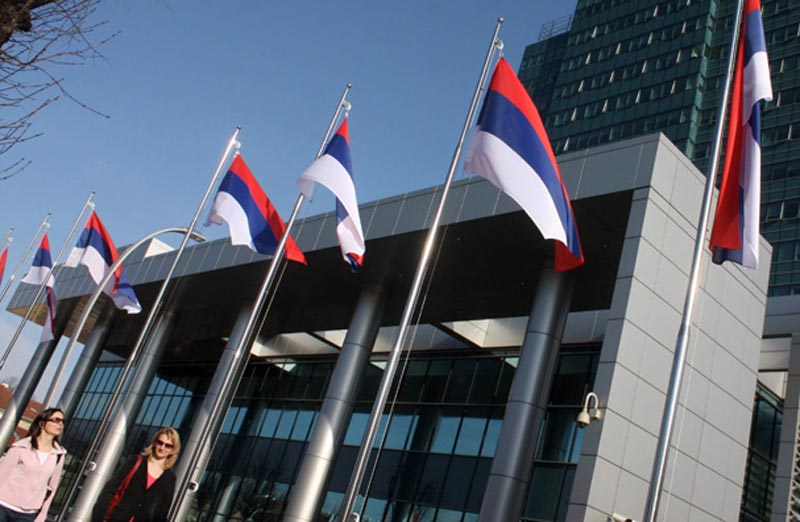
BANJALUKA – The decision of the BiH Constitutional Court pertaining to a referendum on Republika Srpska Day follows a long-standing pattern of operations of this Court as a political instrument of the SDA and the High Representative in an effort to undermine Republika Srpska and centralise the power in Sarajevo, announced the Republika Srpska Government.
A press release, which presents the position of the Republika Srpska Government on the decision of the BiH Constitutional Court on a referendum on Republika Srpska Day, says that the American NGO, Freedom House, has recently published that the decision of the [BiH Constitutional] Court on Republika Srpska Day of 2015 is an “example of politicisation of the judiciary.”
“Two Bosniak judges of the BiH Constitutional Court, who are former SDA officials /secretary-general and vice-president/, vote consistently and in keeping with the political interests of the SDA, and not in keeping with the merit of the case. Foreign judges vote in keeping with the wishes of the High Representative which are usually harmonised with the intentions of the SDA. An Austrian judge, who worked in the Constitutional Court, admitted that there was a ‘tacit agreement between the Court and the High Representative’…,” says the Republika Srpska Government.
The press release says that the political nature of the Court is the reason why a great number of its decisions have never been implemented. “Since 2004, institutions have not implemented 91 decisions of the Constitutional Court. The most glaring example is the Constitutional Court’s decision of 2010 by which the election system for the city of Mostar was declared unconstitutional, and which decision should be implemented only now,” says the press release.
The Republika Srpska Government says that the challenging of Republika Srpska Day by the SDA is an obvious political attempt to humiliate Republika Srpska and produce a crisis.
“Republika Srpska has celebrated Republic Day for 20 years, like Cantons with Bosniak majority celebrate holidays of special importance for Bosniaks and Cantons with Croat majority celebrate holidays of special importance for Croats. Not a single of these holidays did any harm to anyone nor does it violate anyone’s constitutional rights. However, the SDA picked on only one – Republika Srpska Day, which it is now legally challenging while ignoring Croatian and Bosniak holidays,” says the press release published on the internet site of the Republika Srpska Government.
The Government says that Republika Srpska is disappointed that with the new decision of the BiH Constitutional Court the pattern of majority decision-making in keeping with politics and not legal merit continued, stressing that Republika Srpska is still convinced that a referendum on Republika Srpska Day is absolutely in keeping with the applicable laws and the earlier decision of the Constitutional Court on the law on holidays.
The press release says that on the basis of the law on a referendum and civil initiatives of 2010, the Republika Srpska Parliament on July 15, 2016, voted for a referendum where citizens will be asked to say if January 9 should be celebrated as Republika Srpska Day.
”The Republika Srpska Constitution deals with a referendum in Articles 70 and 77. The Venice Commission of the Council of Europe analysed in detail the harmonisation of the Republika Srpska Constitution with the BiH Constitution and did not have a single objection to the Constitution’s regulation on a referendum. The Republika Srpska law on a referendum of 2010 was drafted in the light of the Code of Good Practice of the Venice Commission and recommendations of the Council of Europe’s Ministerial Committee to member states on the participation of citizens in the public life at the local level,” says the press release.
The Republika Srpska Government says that the decision of the Constitutional Court of November 2015 cannot be interpreted as a ban to Republika Srpska to celebrate the date when it was created.
“The decision of the Constitutional Court of November 2015 cannot be interpreted as a ban to Republika Srpska to celebrate January 9 as the date when it was created. Such an interpretation would make every public holiday in both Republika Srpska and the FBiH unconstitutional or it would mean the introduction of ethnic discrimination against Serbs.
If the decision of the Constitutional Court would be interpreted as a ban to Republika Srpska only because it is celebrated on the same day as an Orthodox holiday, St. Stephen, then this would require that all public holidays marking religious holidays – or those which fall on the day of a religious holiday – be banned. Since every day is a Catholic or Orthodox holiday, the ban would pertain to all holidays, including secular ones,” says the Republika Srpska Government.
If the decision of the BiH Constitutional Court would be interpreted as a ban to mark Republika Srpska Day because it allegedly favours one people over another, then this would certainly mean a ban on marking March 1, which the FBiH celebrates as “Independence Day.”
“Federal holiday, March 1, represents an anniversary of a referendum held in 1992 when Bosniaks and Croats unilaterally voted for the secession of Bosnia and Herzegovina from Yugoslavia. Serbs strongly opposed to the referendum and did not vote in it. Serbs consider March 1 the anniversary of an illegal referendum which separated Serbs in BiH from their homeland, Yugoslavia, and led to a war. Federal holiday, March 1 ‘favours’ Bosniaks and Croats at least as much as January 9, Republika Srpska Day, ‘favours’ Serbs,” says the Republika Srpska Government.
